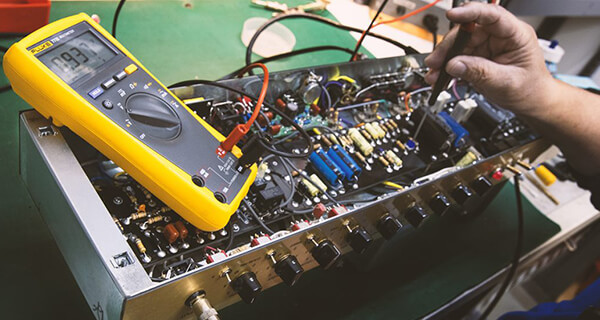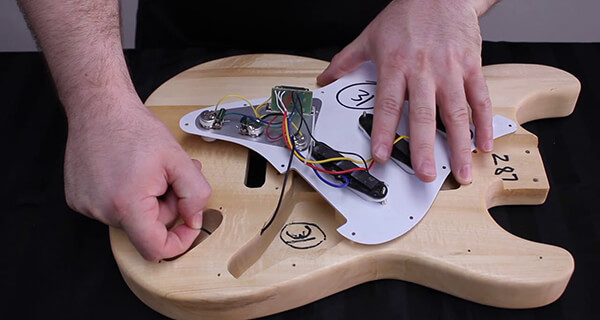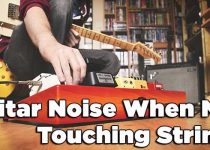Why is My Guitar Amp Buzzing [Reason & Fix]
Musicians and guitar enthusiasts know the sheer frustration of plugging in their beloved guitar to an amplifier, only to be greeted by an unwelcome buzzing or humming sound. This mysterious and annoying noise can disrupt your practice sessions, studio recordings, or live performances, leaving you wondering, “Why is my guitar amp buzzing?”

# Table of Contents =>
- 1 1. Poor Grounding:
- 2 2. Dirty Power Supply:
- 3 3. Faulty or Old Tubes:
- 4 4. Loose or Damaged Wiring:
- 5 5. Radio Frequency Interference (RFI):
- 6 6. Ground Loop:
- 7 7. Faulty Components:
- 8 8. Microphonic Pickups:
- 9 9. Speaker Issues:
- 10 10. Environmental Factors:
- 11 11. Cable Quality:
- 12 12. Pedalboard Issues:
- 13 13. Guitar Grounding:
- 14 14. External Interference:
- 15 15. Tube Amp Maintenance:
1. Poor Grounding:
Cause: Inadequate grounding can lead to electrical interference and buzzing.
Fix: Ensure that both your amp and guitar are properly grounded. Use a three-pronged power cable for your amp and a high-quality shielded instrument cable for your guitar.
2. Dirty Power Supply:
Cause: Voltage fluctuations and dirty power can introduce unwanted noise.
Fix: Use a power conditioner or surge protector to clean the electricity coming into your amp. This can help stabilize the power supply and reduce buzzing.
3. Faulty or Old Tubes:

Cause: Tubes in your amplifier can wear out or become damaged over time.
Fix: Replace the tubes in your amp. Consult your amp’s manual or a professional technician for the correct tube replacement procedure.
4. Loose or Damaged Wiring:
Cause: Loose or damaged internal wiring can cause buzzing.
Fix: Inspect the internal wiring of your amp for loose or frayed connections. Carefully re-solder any loose wires or replace damaged cables.
5. Radio Frequency Interference (RFI):
Cause: Nearby electronic devices or radio signals can interfere with your amp.
Fix: Isolate your amp from electronic devices, and try changing the amp’s location to reduce RFI. Use high-quality shielded cables to minimize interference.
6. Ground Loop:
Cause: When two or more devices in your setup have separate grounds, it can create a ground loop, resulting in a low-frequency hum.
Fix: Use a ground lift adapter on one of the devices or invest in a ground loop isolator to break the loop and eliminate the buzzing.
7. Faulty Components:
Cause: Faulty components within your guitar amp can lead to buzzing and other unwanted noise.
Fix:
a) Visual Inspection:
Start by visually inspecting the internal components of your amp. Look for any visibly damaged or burnt components. Pay special attention to capacitors, as they are prone to bulging or leaking when they fail.
b) Testing Components:

Use a multi-meter to test the components for proper functionality. Check the resistance values of resistors and ensure that capacitors are holding their charge as expected. Refer to your amp’s schematic diagram (if available) for component values and expected readings.
c) Replace Faulty Components:
If you identify any faulty components, you’ll need to replace them. Ensure that you use components with the correct specifications as indicated in your amp’s documentation. If you’re not experienced with soldering and electronics repair, it’s best to consult a professional amp technician for this step.
d) Amp Biasing:
If your amp uses tubes, it’s essential to check and adjust the bias settings after replacing any components. Incorrect bias can lead to noise and performance issues. Consult your amp’s manual or a technician to ensure proper bias adjustment.
e) Complete Maintenance:
While repairing faulty components, it’s a good opportunity to perform overall maintenance on your amp. Clean out dust and debris, tighten loose connections & ensure that all other components are in good working order.
8. Microphonic Pickups:

Cause: Pickups that are microphonic can pick up vibrations and create noise.
Fix: Replace or pot (wax-potting) your pickups to reduce microphonics and minimize unwanted noise.
9. Speaker Issues:
Cause: Damaged or blown speakers can produce buzzing or rattling sounds.
Fix: Inspect your amp’s speakers for visible damage, and replace any that are damaged or blown.
10. Environmental Factors:
Cause: Environmental factors like humidity and temperature can affect your amp’s performance.
Fix: Ensure your amp is in a stable environment with controlled humidity and temperature.
11. Cable Quality:

Cause: Low-quality or damaged cables can introduce noise into your signal chain.
Fix: Invest in high-quality, shielded instrument and speaker cables to reduce interference and buzzing.
12. Pedalboard Issues:
Cause: Poorly isolated or malfunctioning pedals can introduce noise.
Fix: Check your pedalboard for any malfunctioning pedals and use isolated power supplies to reduce noise.
13. Guitar Grounding:

Cause: A poorly grounded guitar can contribute to buzzing issues.
Fix: Make sure your guitar’s grounding is intact, and consider upgrading to a higher-quality instrument cable.
14. External Interference:
Cause: Sometimes, external factors like fluorescent lights or nearby electronic equipment can introduce interference.
Fix: Try turning off or moving away from potential sources of interference.
15. Tube Amp Maintenance:

Cause: Neglecting routine maintenance of your tube amp can lead to buzzing issues.
Fix: Regularly clean and inspect your tube amp for dust, debris, and loose connections.
In conclusion, troubleshooting and resolving the buzzing issue in your guitar amp is vital for any musician. This guide has covered various potential causes and solutions, from simple cable management to more complex electronic problems and interference.
By following the provided tips and instructions, you can diagnose and fix the source of the buzz, ensuring your amplifier delivers a clear, noise-free sound. Don’t let amp buzz disrupt your musical journey, whether you’re a beginner or a seasoned musician. Apply the knowledge from this guide to keep your guitar amp in optimal condition and focus on creating the music you love.
Last Updated on September 28, 2023 by Perry Garner


